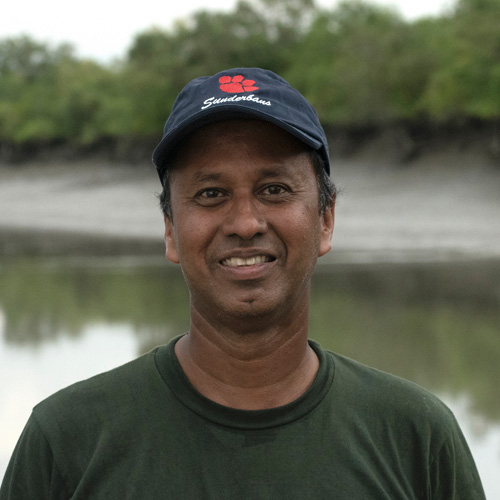Professor, Art & Ecology
Founder and Director, Center for Environmental Arts & Humanities
Subhankar Banerjee is a photographer, writer, curator, and environmental humanities scholar. His creative, curatorial and scholarly efforts focus on biodiversity and climate crises, and on multispecies kinship, caretaking and justice. Since the turn of the century, he has worked closely with Indigenous Gwich’in and Iñupiat elders (who are among his most important teachers), and with scientists and environmental organizations, to defend significant biological nurseries from oil and gas development in Arctic Alaska, including the Arctic National Wildlife Refuge, the Teshekpuk Lake wetland, and the Beaufort and Chukchi seas. His current research also includes the Chihuahuan desert of the US-Mexico borderlands; the Sundarban mangrove forest of the Bangladesh-India borderlands; and global history of biodiversity and shorebirds.
Co-editor (with T.J. Demos and Emily Eliza Scott) of Routledge Companion to Contemporary Art, Visual Culture and Climate Change (Routledge, 2023); editor of Arctic Voices: Resistance at the Tipping Point (Seven Stories Press, 2013); and author-photographer of the multiple award-winning conservation book, Seasons of Life and Land: Arctic National Wildlife Refuge (Mountaineers Books, 2003)—Subhankar most recently served as the director and co-curator (with Jennifer Garcia Peacock) of the award-winning project “a Library, a Classroom, and the World” which was included in the 2022 Venice Biennale art exhibition Personal Structures organized by the European Cultural Centre in Venice, Italy. He was convener of the Decolonizing Nature: resistance, resilience, revitalization (2017) and the last oil: a multispecies justice symposium on Arctic Alaska and beyond (2018) conferences; co-curator (with Josie Lopez) of the US-Mexico transnational exhibition Species in Peril Along the Rio Grande (2019); and co-convener (with US Senator Tom Udall) of the UNM Biodiversity Webinar Series (2020).
His photographs have been exhibited in more than fifty museum exhibitions around the world, including Seasons of Life and Land at the Smithsonian National Museum of Natural History (where it was censored), American Museum of Natural History, California Academy of Sciences and other venues (2003-2005); Resource Wars at the Hood Museum of Art at Dartmouth College; Where I Live I Hope to Know at the Amon Carter Museum of American Art (2011); 18th Biennale of Sydney: all our relations (2012); True North at the Anchorage Museum (2012); Rights of Nature at the Nottingham Contemporary (2015); Long Environmentalism in the Near North at the University of New Mexico Art Museum (2017-2018); Nature’s Nation: American Art and Environment at the Princeton University Art Museum (2018-2019); and Long Environmentalism at the Harwood Museum of Art in Taos (2019-2020).
He serves on the editorial advisory board of the recently launched book series, Global Challenges in the Environmental Humanities (Bloomsbury Academic). His scholarly writing has appeared in a number of journals, including Environmental History, Third Text, Social Text online, Panorama, Network in Canadian History & Environment, and the Scholar & Feminist online; and in anthologies, including Alaska Native Reader: History, Culture, Politics (Duke University Press, 2009), Routledge Handbook of Religion and Ecology (Routledge, 2016), Photographers and Research (Routledge, 2016), Ecocriticism and Indigenous Studies: Conversations from Earth to Cosmos (Routledge, 2017), Living in the Anthropocene: Earth in the Age of Humans (Smithsonian Books, 2017), Global Photography: A Critical History (Routledge, 2020), Staying Together: NatureCulture in a Changing World (Rowman & Littlefield, 2023), and the forthcoming River Delta Futures: Endangered Communities in Audiovisual Media (Bloomsbury Academic, 2025). His public writing has appeared in Scientific American, The New York Review of Books, Los Angeles Review of Books, Santa Fe New Mexican, and the Albuquerque Journal; and online sites, including TomDispatch, Common Dreams, Counterpunch, Truthout, Nation, Salon, La Monde diplomatique, Mongabay, and Scroll. He wrote the Foreword in Audubon at Sea: The Coastal and Transatlantic Adventures of John James Audubon (University of Chicago Press, 2022).
Subhankar has given over 200 invited lectures around the world, including keynotes at the National Humanities Center conference Beyond Despair: Theory and Practice in Environmental Humanities, International Environmental Communication Association (IECA) annual conference, Association for the Study of Literature and Environment (ASLE) biennial conference, 20th Alaska Bird Conference, Copper River Delta Shorebird Festival, and the Pukorokoro Miranda Shorebird Centre in Aotearoa New Zealand, and lectures at Cambridge, Harvard, Princeton, Stanford and Yale University.
Subhankar has received several awards for his conservation and scholarly contributions, including an inaugural Greenleaf Artist Award from the United Nations Environment Programme; inaugural Cultural Freedom Fellowship and Cultural Freedom Award from the Lannan Foundation; Distinguished Alumnus Award from the New Mexico State University; and inaugural Ovation Award and Globally-Engaged Research Award from the University of New Mexico. He was artist in residence at Dartmouth College; visiting scholar at the Institute for Advanced Study-Princeton and the Clare Hall College of the University of Cambridge (where he is a Life Member), and was recently appointed the 45th Ashley Fellow at Trent University in Canada for the 2024-2025 academic year.
Subhankar is currently working on four books and the companion exhibitions. He is serving as editor of the forthcoming book, Coexistence: Biodiversity in New Mexico, which will be a richly illustrated transdisciplinary (arts, humanities, sciences) collection of about 25 chapters, and will be accompanied by a statewide exhibition (UNM Press, 2026). He is also conducting archival and field research for a book on the global history of shorebirds provisionally titled, Shorebirds in Modern Times, which will accompany an exhibition at the Anchorage Museum. He and historian Finis Dunaway are doing research toward a co-authored book on the global history of biodiversity and justice. He is also conducting field research in the Sundarban Tiger Reserve and the Biosphere Reserve in India, a part of the largest mangrove forest on earth, the Sundarban, which is situated in the largest river delta on earth, the Bengal Delta, which spans across coastal Bangladesh and West Bengal, India, which will lead to a book on the Sundarban and an accompanying exhibition.
Subhankar serves as the founding director of the UNM Center for Environmental Arts & Humanities (CEAH) in the Department of Art, which he established with a grant from the Mellon Foundation. The current activities of CEAH are supported by a second grant from the Mellon Foundation.

